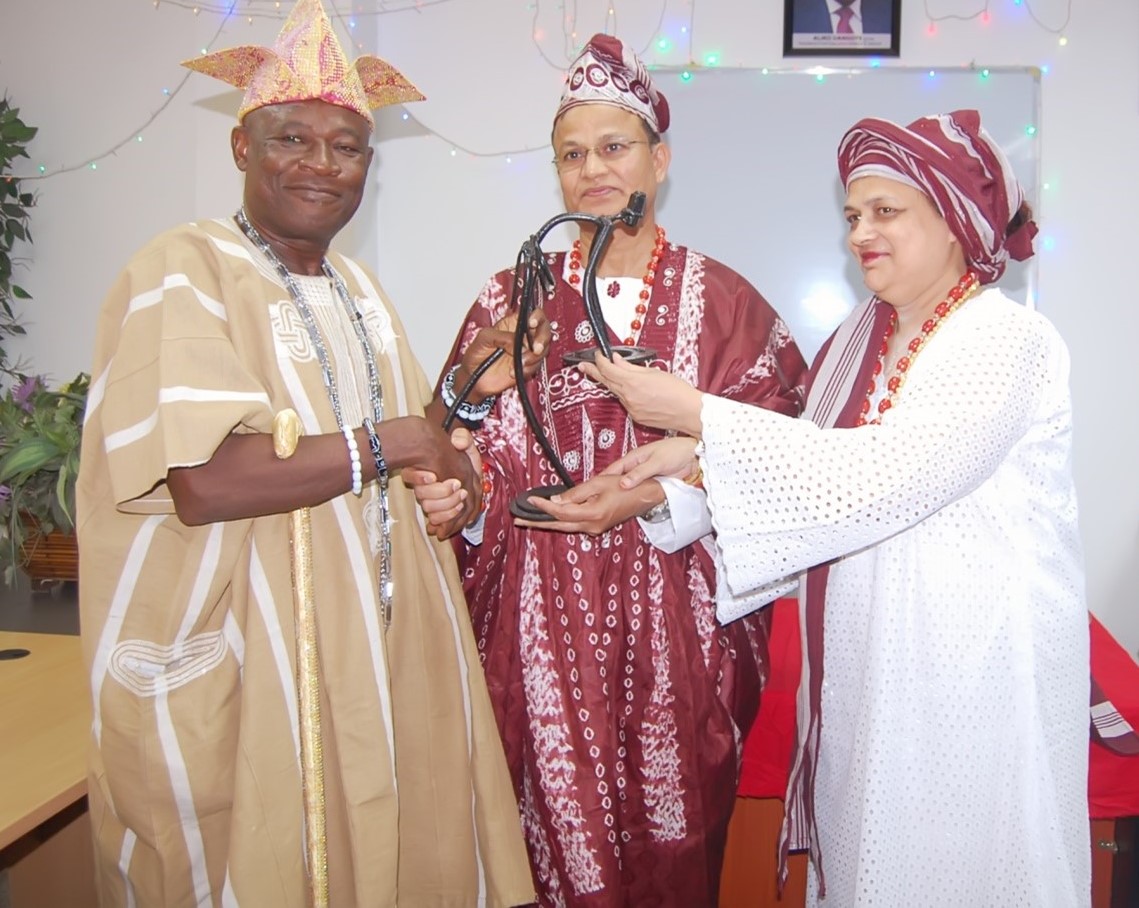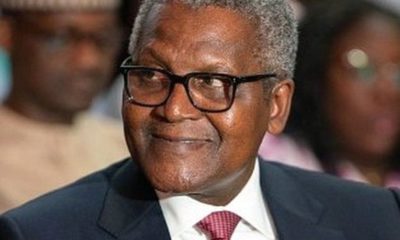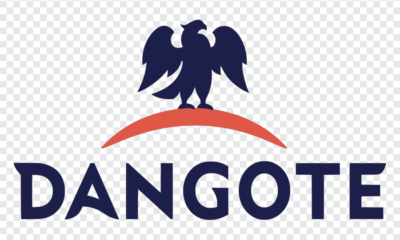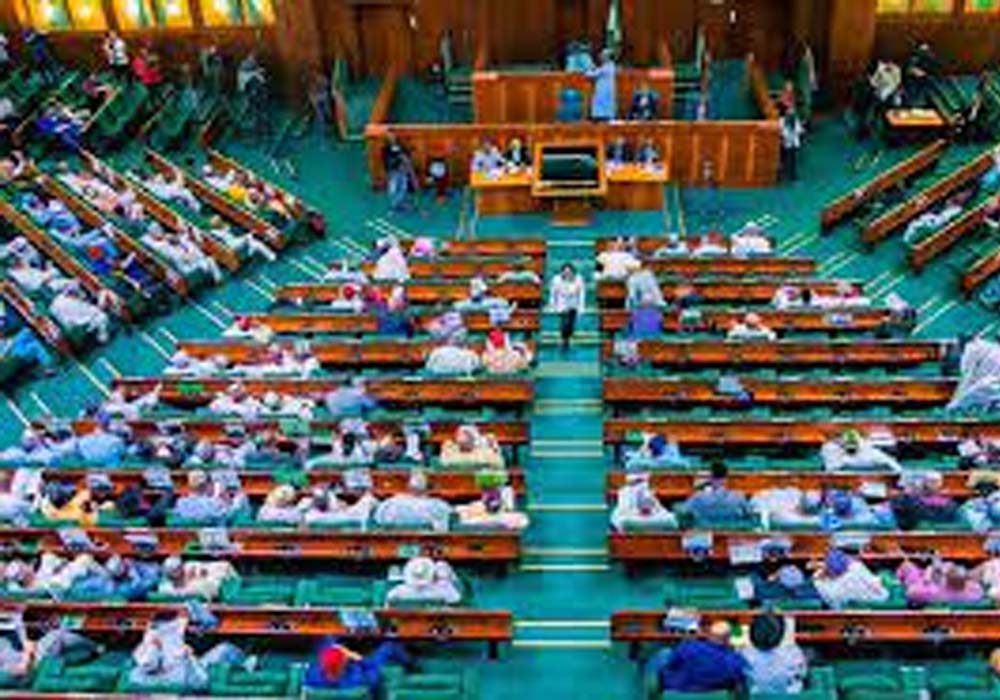Business
Host Community Monarchs Laud Dangote Plant Director’s Leadership

Prominent Traditional rulers from Dangote Cement Ibese host communities have commended the leadership ingenuity of the outgoing Plant Director, Azad Nawabuddin saying his pleasant personality has boosted the cordial relationship between the cement company and the host communities.
It was a moment of accolades for Mr. Nawabuddin, during a send forth ceremony organized for him by the Ibese Plant to bid him farewell to Obajana where he has been transferred, as the monarchs one after the other took turn to shower encomiums on him.
The Aboro of Ibeseland, Oba Rotimi Mulero described the erstwhile Plant Director as a bridge builder whose leadership and administrative style has influenced better collaborations between the host communities and the Dangote Cement in so many areas.
He said the communities witnessed good projects and enjoyed employment enhancing empowerment programmes during the time of Nawabuddin as the Plant Director and would have wished he stayed longer. “Nevertheless, we are happy that the company management recognized his worth and has decided to second him to a bigger plant after all, the reward for hard work is more work.”
In his own remark, the Olu of Aga Olowo, Oba Kayode Adio Kusoro, said the relationship between the host communities and the Dangote Cement, Ibese has never been more cordial than during the tenure of Mr. Nawabuddin as the Plant Director and that his disposition to the community issues has been very commendable.
“The Plant Director is a good man. He listens to us. He is always concerned whenever we have issues to sort out. And that is why he has also enjoyed our cooperations, the communities, the youths, the women and the royal fathers.”, Olu of Aga Olowo stated.
Amidst applause form the staff and the invited guests, the Head, Social Performance, Ibese Plant, Mr. Ade Ojolowo as part of gestures to eulogize the former Ibese Plant Director and described his administration as very eventful while reeling out some milestones that characterized the stay of Mr. Nawabuddin as the head of the cement plant.
Said he: permit me to share with this gathering, some of the key indicators of the outstanding performance of Mr. Nawabuddin Azad in the course of his leadership of this Plant. His time marked an Increase in Ibese Plant Kilns’ Mean Time Before Failure(MTBF) and reduction in production downtime: Ibese Plant’s Year End average Kilns MTBF was between 181 to 200 minutes until Mr. Azad became the Plant Director. He introduced the use of Asonic Horns and ID fans tipping in all the four Lines to get to the current level of between 580 to 600 minutes. This is over 90% above the budgeted figure of 300 minutes, and has led to significant reduction in production downtime.
“Production volume and dispatch increase: The Plant also witnessed increase in cement production volume from about 6.7 million tons in 2018 to about 7.9 million tons and increase in Cement Dispatch to about 8.0 million tons under the leadership of Mr. Azad.
“In-house refurbishment of Rollers and attendant Forex Savings: DCP used to procure Raw Mills & Cement Mills Roller assemblies for replacement from overseas before Mr. Azad joined Ibese as PD. Procurement of these roller assemblies was stopped through his ingenuity, and in-house refurbishment of the old rollers commenced. This has been successfully implemented till date, with savings of over 500,000 Euros so far.
“Championing of Alternative Fuels Project: Ibese Plant is at the forefront of the DCP’s vision to get into International carbon trading after benchmarking its carbon footprint. Thanks to the introduction of the Alternative Fuels Project, which also has led to the stoppage of importation of expensive & high CO2 emission factor, coal. Agro-waste usage and substitution of coal saved the company 2.77 million USD and 17.3 million USD in the year 2022 and 2023 respectively, and the saving is expected to go higher in 2024 due to the just completed AF projects in all the four lines.
“As a friend of the community, Mr. Azad’s passion for the local communities as critical stakeholders to the Plant is outstanding. Our modest achievements in Social Performance in the last couple of years has been through his personal values and commitment, which has yielded unhindered support and collaboration. We have been able to record some firsts in our intervention programmes, including the Annual community day event; Women empowerment programme; Care for the elders, and Support for the vulnerable during festive periods etc. It is also to his adulation that we have recorded improved social investment delivery, improved relationship with key government functionaries, and overall local content development.”
Business
JUST IN: Dangote Refinery Suspends Fuel Sales In Naira

The Dangote Petroleum Refinery has announced a temporary suspension of petroleum product sales in Naira, citing a misalignment between its sales proceeds and crude oil purchase obligations, which are currently denominated in U.S. dollars.
In a statement issued on Wednesday, the refinery explained that its sales in Naira had exceeded the value of Naira-denominated crude it had received.
As a result, the company said it was necessary to adjust its sales currency to align with its crude procurement requirements.
The refinery also addressed online reports alleging that loading activities had been halted due to ticketing fraud.
Dismissing the claims as “malicious falsehoods,” Dangote Refinery assured stakeholders that its systems remain robust and that no fraudulent activities had occurred.
The statement reads, “We wish to inform you that, Dangote Petroleum Refinery has temporarily halted the sale of petroleum products in Naira. This decision is necessary to avoid a mismatch between our sales proceeds and our crude oil purchase obligations, which are currently denominated in U.S. dollars.
“To date, our sales of petroleum products in Naira have exceeded the value of Naira-denominated crude we have received. As a result, we must temporarily adjust our sales currency to align with our crude procurement currency.
“Our attention has also been drawn to reports on the internet claiming that we are stopping loading due to an incident of ticketing fraud. This is malicious falsehood. Our systems are robust and we have had no fraud issues.
“We remain committed to serving the Nigerian market efficiently and sustainably. As soon as we receive an allocation of Naira-denominated crude cargoes from NNPC, we will promptly resume petroleum product sales in Naira.
It added “We appreciate your understanding and cooperation during this period”.
Business
Gold Hits Record $3,045 As Global Tensions Rise

Stock markets in Europe and Asia showed mixed performances on Wednesday, while gold reached a historic high, surpassing $3,045 per ounce.
The rise in gold prices was driven by renewed geopolitical concerns and trade uncertainties, following a tech-led selloff on Wall Street on Tuesday.
Investors turned to gold as a safe-haven asset after Israel carried out its most intense airstrikes on Gaza since a ceasefire with Hamas took effect.
Despite the escalation, oil prices edged lower as Hamas signaled openness to negotiations and urged international intervention for a truce.
READ ALSO: OPEC Reports Significant Global Market Shifts As Dangote Refinery Exports Fuel
The U.S. Federal Reserve is expected to maintain its interest rate pause as it navigates economic turbulence linked to former President Donald Trump’s shifting tariff policies.
Many economists warn that the ongoing trade disputes, along with retaliatory measures from affected nations, could push the U.S. and other economies toward recession.
In Europe, markets showed varied trends, with London’s FTSE 100 and Frankfurt’s DAX dipping slightly, while Paris’ CAC 40 registered a gain.
Official data from the eurozone revealed that inflation slowed to 2.3% in February, a minor revision from the previously reported 2.4%, largely due to moderating consumer prices in Germany.
Asian markets also fluctuated, with Japan’s Nikkei 225 reversing earlier gains to end lower after the Bank of Japan opted to keep interest rates unchanged.
The central bank cited “high uncertainties” in the global economy, particularly concerning trade.
Meanwhile, Indonesia’s stock market attempted a mild recovery after Tuesday’s sharp decline of more than 7%, its biggest drop since 2011, amid concerns over weak consumer spending.
Political and Economic Pressures Mount
In Moscow, Russia accused Ukraine of attempting to “derail” agreements between President Vladimir Putin and former U.S. President Donald Trump aimed at halting strikes on energy infrastructure.
In Turkey, the lira plunged to an all-time low of 39 per dollar following a police raid on the home of Istanbul’s opposition mayor, Ekrem Imamoglu.
His detention over a corruption probe was condemned by his CHP party as a “coup,” adding to concerns over political stability in the country.
As U.S. markets prepared to reopen, analysts predicted a cautious session.
Susannah Streeter, head of money and markets at Hargreaves Lansdown, commented: “The S&P 500 is set to open flat, amid high caution ahead of the crunch central bank decision.”
She added, “The Fed is widely expected to keep interest rates on hold, but investors will be hanging on [Fed chief] Jerome Powell’s words about future rate cuts. The tide has turned, with even the prospect of lowering borrowing costs unlikely to provide much solace given that they would be seen as indicating increasing weakness in the US economy.”
Key Market Figures (as of 10:30 GMT):
London – FTSE 100: ↓ 0.1% (8,696.72)
Paris – CAC 40: ↑ 0.5% (8,154.74)
Frankfurt – DAX: ↓ 0.1% (23,351.57)
Tokyo – Nikkei 225: ↓ 0.3% (37,751.88)
Hong Kong – Hang Seng: ↑ 0.1% (24,771.14)
Shanghai – Composite: ↓ 0.1% (3,426.43)
New York – Dow: ↓ 0.6% (41,581.31)
Currencies & Commodities:
Euro/Dollar: ↓ $1.0898
Pound/Dollar: ↓ $1.2969
Dollar/Yen: ↑ ¥149.73
Gold: ↑ $3,045 per ounce
WTI Crude Oil: ↓ 0.4% ($66.50 per barrel)
Brent Crude: ↓ 0.3% ($70.33 per barrel)
Business
DCP Zambia Bags Three Sustainability Awards

The Dangote Cement Zambia, a subsidiary of the Dangote Cement Plc has bagged three awards at the 6th national Corporate Social Responsibility (CSR) & Sustainability Awards in Lusaka, the Zambian capital.
It was gathered that at the awards organised by CSR Network Zambia, the company carted home the Food Security Initiative Award in the Excellence in Agriculture category, the Best Waste Recycling Initiative Award in the Environmental Sustainability category, and the Mental Healthcare Award in the Excellence in the Workplace category.
The award ceremony with the theme Driving Sustainable Impact through Innovation place held at Mulungushi International Conference Centre, Lusaka.
ALSO READ: Palliatives: ADF Gifts 80,000 Bags Of Rice To Lagos
The event saw the participation from the country’s over 60 major corporate organizations celebrating outstanding impactful CSR & Sustainability initiatives.
CSR Network Zambia’s Executive Director, Lee Muzala, commended Dangote Cement Zambia for its outstanding contributions to sustainable development and community empowerment.
He stated, “Dangote Cement Zambia has demonstrated exceptional commitment to driving positive change in agriculture, environmental sustainability, and workplace well-being. These awards are a testament to their dedication to creating a lasting impact in Zambia.”
Receiving the award, Head Environment and Social Performance (Sustainability Lead) Dangote Cement Zambia, Víctor Mpundu said, “We are deeply honoured to receive these prestigious awards. They reflect our unwavering commitment to sustainability and our efforts to make a meaningful difference in the communities we serve. At Dangote Cement, we believe that sustainable development is not just a responsibility but a core value that drives our operations.”
These awards are a significant milestone for Dangote Cement Zambia, highlighting the company’s leadership in sustainability and corporate social responsibility. They underscore the company’s efforts to promote food security through agricultural support, environmental conservation through innovative waste recycling initiatives, and employee well-being through mental health and wellness programs.
The recognition not only reinforces Dangote Cement Zambia’s position as a socially responsible corporate citizen but also serves as a motivation to continue driving impactful initiatives that contribute to the sustainable development of Zambia.
The Dangote Cement Plant, Zambia, located in Ndola, is a 1.5mta capacity fully integrated plant and part of Dangote Cement Group. In addition, Dangote Cement has operations in Cameroon (1.5Mta clinker grinding), Congo (1.5Mta), Ghana (2.0Mta clinker grinding and import), Ethiopia (2.5Mta), Senegal (1.5Mta), Sierra Leone (0.5Mta import), South Africa (2.8Mta), Tanzania (3.0Mta).
Dangote Cement is Africa’s leading cement producer with 52.0Mta capacity across Africa. A fully integrated quarry-to-customer producer, with a production capacity of 35.25Mta in its home market, Nigeria. Obajana plant in Kogi state, Nigeria, is the largest in Africa with 16.25Mta of capacity across five lines; Ibese plant in Ogun State has four cement lines with a combined installed capacity of 12Mta; Gboko plant in Benue state has 4Mta; and Okpella plant in Edo state has 3Mta.
Through recent investments, Dangote Cement has eliminated Nigeria’s dependence on imported cement and has transformed the nation into an exporter of cement and clinker, serving neighbouring countries.





















